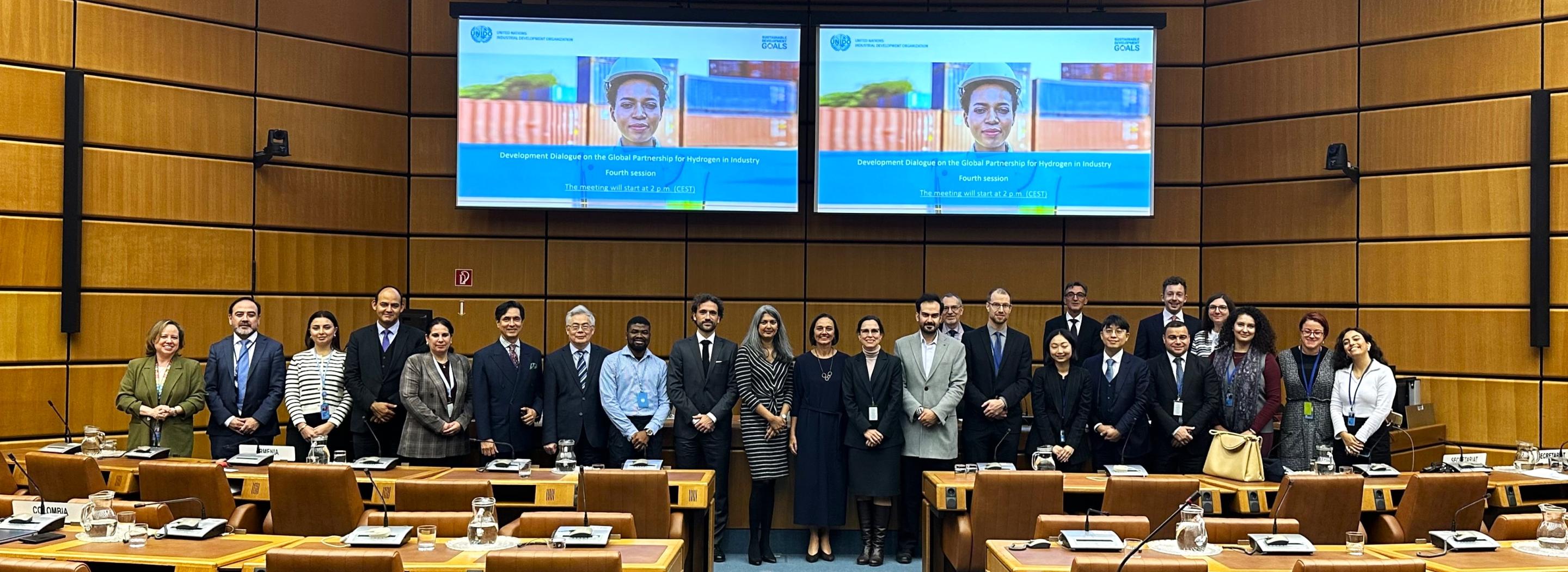The fourth Development Dialogue on UNIDO’s Global Partnership for Hydrogen in Industry
15 October 2024
Vienna
UNIDO
Hybrid
UNIDO hosted the fourth session of the Development Dialogue on its Global Partnership for Hydrogen in Industry at its headquarters in Vienna. The event, held in a hybrid format, brought together representatives from Member States, including their Permanent Missions, industries, and other key stakeholders to discuss hydrogen's role in sustainable development.
Building on previous sessions (example), the Dialogue introduced UNIDO's key initiatives such as the Global Clean Hydrogen Programme. Expert panellists from government, industry, and development finance institutions provided insights on hydrogen standards, certification schemes, financing mechanisms, and skills development. The event also featured a briefing on the upcoming Hydrogen Declaration for COP29 and addressed opportunities for collaboration to scale hydrogen solutions globally.
Managing Director, Gunther Beger, opened the Dialogue by emphasizing the importance of clean hydrogen in the global energy transition. He highlighted UNIDO’s role in supporting capacity building, fostering collaborations, and driving hydrogen adoption in developing and transition economies. Concluding, he stressed the significance of partnerships, stating:
"A just hydrogen transition requires collaboration from all of us. By sharing knowledge and resources, we can ensure that the benefits of this transition reach developing nations. The insights shared today will help us align our global efforts and build the partnerships needed for a sustainable and inclusive hydrogen economy. I am confident that together, we can find effective solutions to unlock the full potential of clean hydrogen."
Summary of the key messages from each speaker is presented below:
- Petra Schwager (Chief, Climate and Technology Partnerships Division, UNIDO): Spoke about UNIDO’s Global Programme for Hydrogen in Industry, stressing the need for countries to use hydrogen for building up their own industries. She highlighted the importance of partnerships and UNIDO’s collaboration with various organizations to ensure a just and sustainable hydrogen transition.
- Clovis Zapata (Country representative in Brazil, UNIDO): Highlighted Brazil’s central role in the global hydrogen market, leveraging its renewable energy potential. He discussed the country's commitment to expanding low-carbon hydrogen production and the national regulatory measures to support this, with the goal of making Brazil a leader in low-carbon hydrogen by 2030.
- Andrei Bazan (First Secretary, Alternate Permanent Representative and Consul, Philippines Embassy and Permanent Mission to the United Nations and other International Organizations in Vienna): Addressed the Philippines' efforts to develop hydrogen as a clean energy source, in line with the country’s energy security and low-carbon goals. He emphasized the role of hydrogen in boosting national capacities and the importance of UNIDO’s support in de-risking investments and developing policy frameworks.
- Dr. Pradeep Tharakan (Director, Energy Transition, Asian Development Bank): Focused on ADB's commitment to supporting hydrogen development through large-scale renewable energy projects. He highlighted the importance of hydrogen hubs and the role of financing mechanisms to de-risk hydrogen investments, particularly in the Asia-Pacific region.
- Dr. Carla Robledo (Senior Policy Advisor, Ministry of Climate Policy and Green Growth, The Netherlands): Underscored the importance of the International Hydrogen Trade Forum (IHTF) in promoting collaboration between hydrogen-exporting and importing regions. She highlighted UNIDO's significant role as forum coordinator and emphasized the necessity of creating demand, developing infrastructure, and securing financing to scale global hydrogen trade, particularly in emerging markets.
- Björn Noack (Power Solutions, Director Governmental Affairs Electrolysis (PS/SGO-EY, Bosch): Presented Bosch’s approach to supporting the energy transition through hydrogen technologies. He emphasized the company’s focus on scaling hydrogen production by manufacturing PEM electrolyzer stacks and contributing to local hydrogen ecosystems through supply chain development.
- Luis Umanzor (Industrial Development Officer, Climate and Technology Partnerships Division, UNIDO): Highlighted UNIDO’s Global Clean Hydrogen Programme, developed in collaboration with the Global Environment Facility (GEF). The program supports countries by enhancing their capacity, policy frameworks, and technical readiness for hydrogen production and local application. He emphasized the importance of pilot projects as learning tools and UNIDO's efforts in promoting green hydrogen industrial clusters to develop local industries based on renewable energy.
- Dr. Xue Wang (Chief of Application Division, International Hydrogen Energy Center, China): Discussed the International Hydrogen Energy Center’s work on hydrogen technology and industrialization. Wang emphasized large-scale hydrogen production and long-distance transportation projects, including a demonstration project in Inner Mongolia, China.
- Smeeta Fokeer (Research and Industrial Policy Officer, Climate and Technology Partnerships Division, UNIDO): Discussed the Hydrogen Declaration for COP29, which UNIDO has been entrusted with coordinating. The Declaration focuses on decarbonizing existing hydrogen production, increasing demand for clean hydrogen, and ensuring a just transition. She also highlighted that UNIDO will host several key hydrogen-related events at COP29, highlighting its role in advancing sustainable hydrogen projects and fostering global partnerships.

